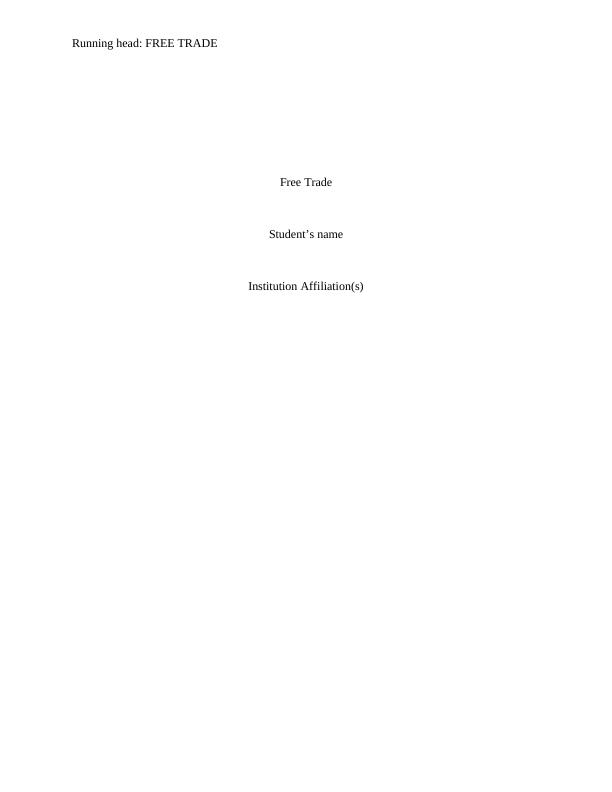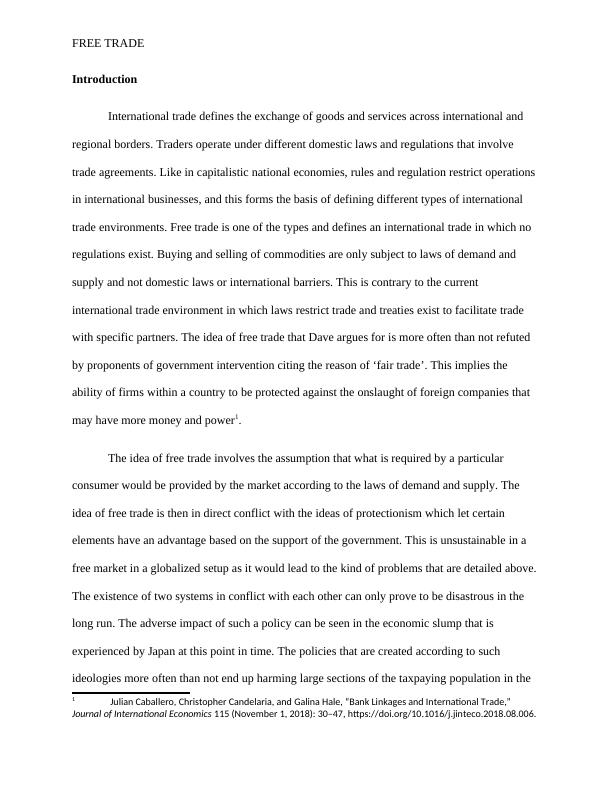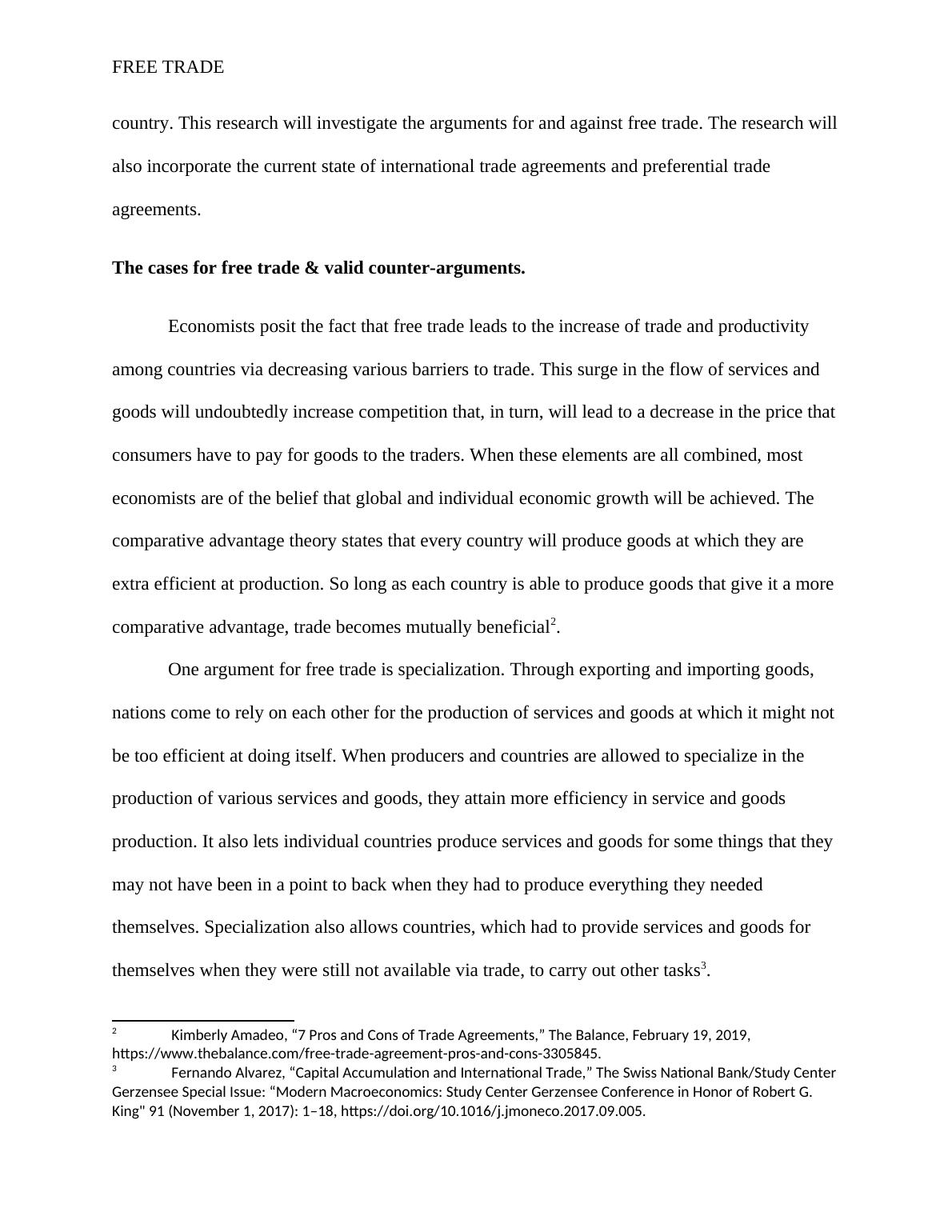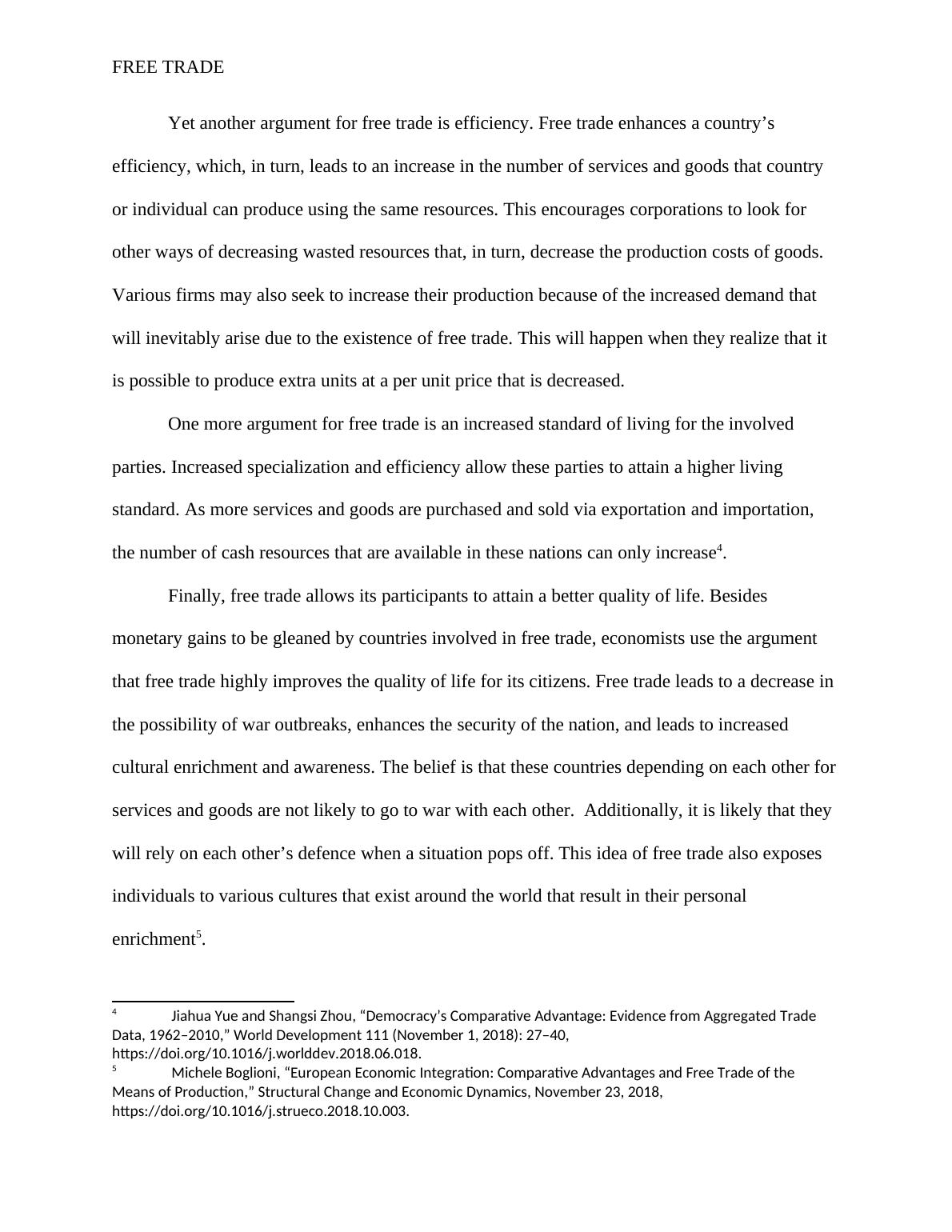Free Trade: Arguments for and Against
16 Pages3898 Words146 Views
Added on 2023-04-08
About This Document
This article explores the arguments for and against free trade, including specialization, efficiency, and increased standard of living. It also discusses the current state of international trade agreements and negotiations.
Free Trade: Arguments for and Against
Added on 2023-04-08
ShareRelated Documents
Running head: FREE TRADE
Free Trade
Student’s name
Institution Affiliation(s)
Free Trade
Student’s name
Institution Affiliation(s)

FREE TRADE
Introduction
International trade defines the exchange of goods and services across international and
regional borders. Traders operate under different domestic laws and regulations that involve
trade agreements. Like in capitalistic national economies, rules and regulation restrict operations
in international businesses, and this forms the basis of defining different types of international
trade environments. Free trade is one of the types and defines an international trade in which no
regulations exist. Buying and selling of commodities are only subject to laws of demand and
supply and not domestic laws or international barriers. This is contrary to the current
international trade environment in which laws restrict trade and treaties exist to facilitate trade
with specific partners. The idea of free trade that Dave argues for is more often than not refuted
by proponents of government intervention citing the reason of ‘fair trade’. This implies the
ability of firms within a country to be protected against the onslaught of foreign companies that
may have more money and power1.
The idea of free trade involves the assumption that what is required by a particular
consumer would be provided by the market according to the laws of demand and supply. The
idea of free trade is then in direct conflict with the ideas of protectionism which let certain
elements have an advantage based on the support of the government. This is unsustainable in a
free market in a globalized setup as it would lead to the kind of problems that are detailed above.
The existence of two systems in conflict with each other can only prove to be disastrous in the
long run. The adverse impact of such a policy can be seen in the economic slump that is
experienced by Japan at this point in time. The policies that are created according to such
ideologies more often than not end up harming large sections of the taxpaying population in the
1 Julian Caballero, Christopher Candelaria, and Galina Hale, “Bank Linkages and International Trade,”
Journal of International Economics 115 (November 1, 2018): 30–47, https://doi.org/10.1016/j.jinteco.2018.08.006.
Introduction
International trade defines the exchange of goods and services across international and
regional borders. Traders operate under different domestic laws and regulations that involve
trade agreements. Like in capitalistic national economies, rules and regulation restrict operations
in international businesses, and this forms the basis of defining different types of international
trade environments. Free trade is one of the types and defines an international trade in which no
regulations exist. Buying and selling of commodities are only subject to laws of demand and
supply and not domestic laws or international barriers. This is contrary to the current
international trade environment in which laws restrict trade and treaties exist to facilitate trade
with specific partners. The idea of free trade that Dave argues for is more often than not refuted
by proponents of government intervention citing the reason of ‘fair trade’. This implies the
ability of firms within a country to be protected against the onslaught of foreign companies that
may have more money and power1.
The idea of free trade involves the assumption that what is required by a particular
consumer would be provided by the market according to the laws of demand and supply. The
idea of free trade is then in direct conflict with the ideas of protectionism which let certain
elements have an advantage based on the support of the government. This is unsustainable in a
free market in a globalized setup as it would lead to the kind of problems that are detailed above.
The existence of two systems in conflict with each other can only prove to be disastrous in the
long run. The adverse impact of such a policy can be seen in the economic slump that is
experienced by Japan at this point in time. The policies that are created according to such
ideologies more often than not end up harming large sections of the taxpaying population in the
1 Julian Caballero, Christopher Candelaria, and Galina Hale, “Bank Linkages and International Trade,”
Journal of International Economics 115 (November 1, 2018): 30–47, https://doi.org/10.1016/j.jinteco.2018.08.006.

FREE TRADE
country. This research will investigate the arguments for and against free trade. The research will
also incorporate the current state of international trade agreements and preferential trade
agreements.
The cases for free trade & valid counter-arguments.
Economists posit the fact that free trade leads to the increase of trade and productivity
among countries via decreasing various barriers to trade. This surge in the flow of services and
goods will undoubtedly increase competition that, in turn, will lead to a decrease in the price that
consumers have to pay for goods to the traders. When these elements are all combined, most
economists are of the belief that global and individual economic growth will be achieved. The
comparative advantage theory states that every country will produce goods at which they are
extra efficient at production. So long as each country is able to produce goods that give it a more
comparative advantage, trade becomes mutually beneficial2.
One argument for free trade is specialization. Through exporting and importing goods,
nations come to rely on each other for the production of services and goods at which it might not
be too efficient at doing itself. When producers and countries are allowed to specialize in the
production of various services and goods, they attain more efficiency in service and goods
production. It also lets individual countries produce services and goods for some things that they
may not have been in a point to back when they had to produce everything they needed
themselves. Specialization also allows countries, which had to provide services and goods for
themselves when they were still not available via trade, to carry out other tasks3.
2 Kimberly Amadeo, “7 Pros and Cons of Trade Agreements,” The Balance, February 19, 2019,
https://www.thebalance.com/free-trade-agreement-pros-and-cons-3305845.
3 Fernando Alvarez, “Capital Accumulation and International Trade,” The Swiss National Bank/Study Center
Gerzensee Special Issue: “Modern Macroeconomics: Study Center Gerzensee Conference in Honor of Robert G.
King" 91 (November 1, 2017): 1–18, https://doi.org/10.1016/j.jmoneco.2017.09.005.
country. This research will investigate the arguments for and against free trade. The research will
also incorporate the current state of international trade agreements and preferential trade
agreements.
The cases for free trade & valid counter-arguments.
Economists posit the fact that free trade leads to the increase of trade and productivity
among countries via decreasing various barriers to trade. This surge in the flow of services and
goods will undoubtedly increase competition that, in turn, will lead to a decrease in the price that
consumers have to pay for goods to the traders. When these elements are all combined, most
economists are of the belief that global and individual economic growth will be achieved. The
comparative advantage theory states that every country will produce goods at which they are
extra efficient at production. So long as each country is able to produce goods that give it a more
comparative advantage, trade becomes mutually beneficial2.
One argument for free trade is specialization. Through exporting and importing goods,
nations come to rely on each other for the production of services and goods at which it might not
be too efficient at doing itself. When producers and countries are allowed to specialize in the
production of various services and goods, they attain more efficiency in service and goods
production. It also lets individual countries produce services and goods for some things that they
may not have been in a point to back when they had to produce everything they needed
themselves. Specialization also allows countries, which had to provide services and goods for
themselves when they were still not available via trade, to carry out other tasks3.
2 Kimberly Amadeo, “7 Pros and Cons of Trade Agreements,” The Balance, February 19, 2019,
https://www.thebalance.com/free-trade-agreement-pros-and-cons-3305845.
3 Fernando Alvarez, “Capital Accumulation and International Trade,” The Swiss National Bank/Study Center
Gerzensee Special Issue: “Modern Macroeconomics: Study Center Gerzensee Conference in Honor of Robert G.
King" 91 (November 1, 2017): 1–18, https://doi.org/10.1016/j.jmoneco.2017.09.005.

FREE TRADE
Yet another argument for free trade is efficiency. Free trade enhances a country’s
efficiency, which, in turn, leads to an increase in the number of services and goods that country
or individual can produce using the same resources. This encourages corporations to look for
other ways of decreasing wasted resources that, in turn, decrease the production costs of goods.
Various firms may also seek to increase their production because of the increased demand that
will inevitably arise due to the existence of free trade. This will happen when they realize that it
is possible to produce extra units at a per unit price that is decreased.
One more argument for free trade is an increased standard of living for the involved
parties. Increased specialization and efficiency allow these parties to attain a higher living
standard. As more services and goods are purchased and sold via exportation and importation,
the number of cash resources that are available in these nations can only increase4.
Finally, free trade allows its participants to attain a better quality of life. Besides
monetary gains to be gleaned by countries involved in free trade, economists use the argument
that free trade highly improves the quality of life for its citizens. Free trade leads to a decrease in
the possibility of war outbreaks, enhances the security of the nation, and leads to increased
cultural enrichment and awareness. The belief is that these countries depending on each other for
services and goods are not likely to go to war with each other. Additionally, it is likely that they
will rely on each other’s defence when a situation pops off. This idea of free trade also exposes
individuals to various cultures that exist around the world that result in their personal
enrichment5.
4 Jiahua Yue and Shangsi Zhou, “Democracy’s Comparative Advantage: Evidence from Aggregated Trade
Data, 1962–2010,” World Development 111 (November 1, 2018): 27–40,
https://doi.org/10.1016/j.worlddev.2018.06.018.
5 Michele Boglioni, “European Economic Integration: Comparative Advantages and Free Trade of the
Means of Production,” Structural Change and Economic Dynamics, November 23, 2018,
https://doi.org/10.1016/j.strueco.2018.10.003.
Yet another argument for free trade is efficiency. Free trade enhances a country’s
efficiency, which, in turn, leads to an increase in the number of services and goods that country
or individual can produce using the same resources. This encourages corporations to look for
other ways of decreasing wasted resources that, in turn, decrease the production costs of goods.
Various firms may also seek to increase their production because of the increased demand that
will inevitably arise due to the existence of free trade. This will happen when they realize that it
is possible to produce extra units at a per unit price that is decreased.
One more argument for free trade is an increased standard of living for the involved
parties. Increased specialization and efficiency allow these parties to attain a higher living
standard. As more services and goods are purchased and sold via exportation and importation,
the number of cash resources that are available in these nations can only increase4.
Finally, free trade allows its participants to attain a better quality of life. Besides
monetary gains to be gleaned by countries involved in free trade, economists use the argument
that free trade highly improves the quality of life for its citizens. Free trade leads to a decrease in
the possibility of war outbreaks, enhances the security of the nation, and leads to increased
cultural enrichment and awareness. The belief is that these countries depending on each other for
services and goods are not likely to go to war with each other. Additionally, it is likely that they
will rely on each other’s defence when a situation pops off. This idea of free trade also exposes
individuals to various cultures that exist around the world that result in their personal
enrichment5.
4 Jiahua Yue and Shangsi Zhou, “Democracy’s Comparative Advantage: Evidence from Aggregated Trade
Data, 1962–2010,” World Development 111 (November 1, 2018): 27–40,
https://doi.org/10.1016/j.worlddev.2018.06.018.
5 Michele Boglioni, “European Economic Integration: Comparative Advantages and Free Trade of the
Means of Production,” Structural Change and Economic Dynamics, November 23, 2018,
https://doi.org/10.1016/j.strueco.2018.10.003.

End of preview
Want to access all the pages? Upload your documents or become a member.
Related Documents
The Assignment on Global Economylg...
|13
|3496
|42
Concept of Neoliberalism and Democracylg...
|5
|1454
|83
Benefits of Unrestricted Free Trade and Competitive Advantage in Nationslg...
|6
|1216
|48
Protectionism and Free Trade Assignmentlg...
|14
|3993
|56
Trade and Multinational Companieslg...
|9
|3013
|82
Pros and Cons of Economic Protectionismlg...
|5
|753
|32
